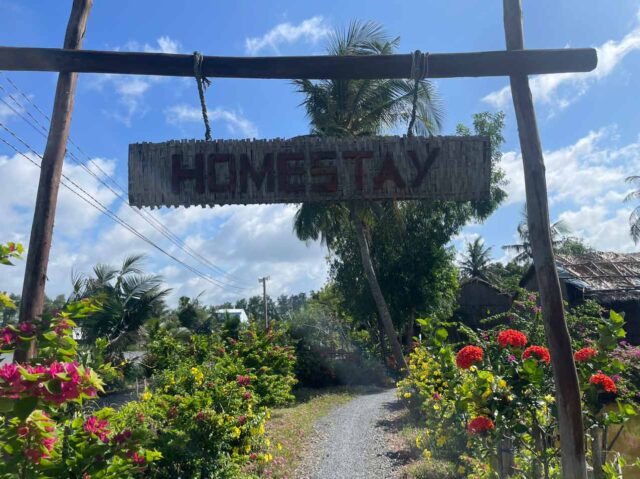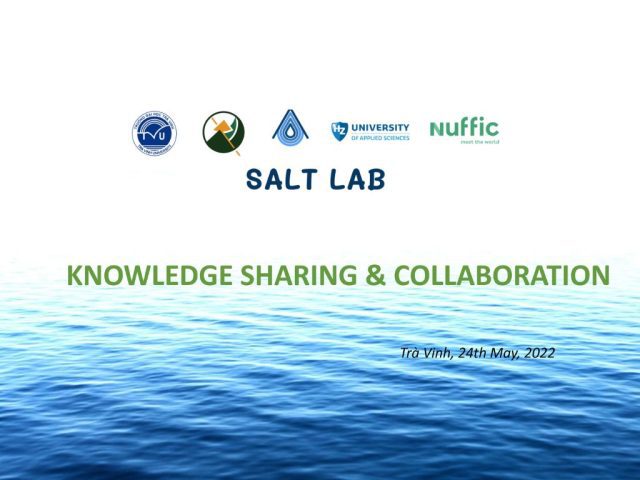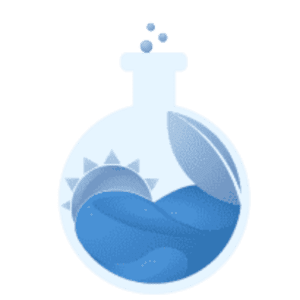Prepare for an exciting journey into the diverse landscape of farming, where aquaculture and crop cultivation meet agritourism. Let’s explore the interesting stories of innovative farmers who are tackling challenges, from adapting to changing water conditions to maneuvering through market fluctuations.
Aquaculture Combined with Agritourism
Ms. Nguyen Thi Bich Van is a dedicated leader in Con Chim hamlet, currently serving as the Head of the Women’s Union. She manages a diverse agricultural area covering about 9000 square meters, encompassing shrimp and crab ponds alongside rice fields during the rainy season. An additional 2000 square meters of adjacent land is cultivated with various vegetation, enriching her agricultural endeavors.
Saline intrusion challenges the community’s water source, occurring earlier and extending later in recent years. Farmers in Con Chim have adapted to the alternating cycle of saltwater and freshwater, ensuring year-round income by shifting between shrimp farming and rice cultivation. To combat this, Ms. Van also stores fresh water on specific lunar calendar days when river water levels rise. Moreover, Ms. Van and her community are implementing adaptations, including government support for tourism development, shifting to aquaculture practices, and diversifying crop cultivation. Her ecotourism model generates annual profits, and rice yields provide additional income.
Challenges persist, however, including limitations in cultivating certain crops during the dry season and the need to purchase clean water. Groundwater sources are diminishing, necessitating powerful water-pumping equipment. Looking ahead, Ms. Van aims to further advance the eco-tourism model, expand crop cultivation, and explore new opportunities such as pandanus tea production.
Mangrove Combined with Shrimp and Crab Farming
Mr. Phuc is an experienced farmer with a family tradition of cultivating shrimp and crab in mangrove ecosystems. Currently, He manages 5 hectares of mangrove forests for tiger shrimp and crab cultivation and 3 hectares of large-scale shrimp ponds. Despite the trend towards high-tech industrial aquaculture, Mr. Phuc and his family are committed to their ecological approach, which not only aligns with market demand but also yields commendable profits. He sources water from a nearby river and uses natural observations rather than complex techniques to maintain water quality. However, he is facing challenges from water pollution caused by nearby industrial ponds.
To address these challenges, Mr. Phuc implements measures like introducing clean water during rising tides and using settling ponds to filter river water. In the future, Mr. Phuc aims to continue both traditional shrimp and crab cultivation and eco-tourism development on his family’s land.
Freshwater Fish
Mr. Saret, with 12 years of experience in farming, specializes in intensive snakehead fish farming and actively shares knowledge with the local community. He manages 6 aquaculture ponds, primarily focused on snakehead fish, but has transitioned 2 ponds to white-leg shrimp farming due to market dynamics. He sources water from nearby rivers, treats it to prevent diseases, and discharges it into canals.
His challenges include water scarcity in the dry season, poor water quality in the rainy season, and price instability. In addition, high water salinity from November to April impacts fish health and profits, and lack of electricity prevents well drilling. His adaptation methods include water storage, chemical treatment, and transitioning some ponds to shrimp farming. In the coming years, he plans involve maintaining snakehead fish farming, upholding shrimp ponds, and investing in well drilling for clean water.





